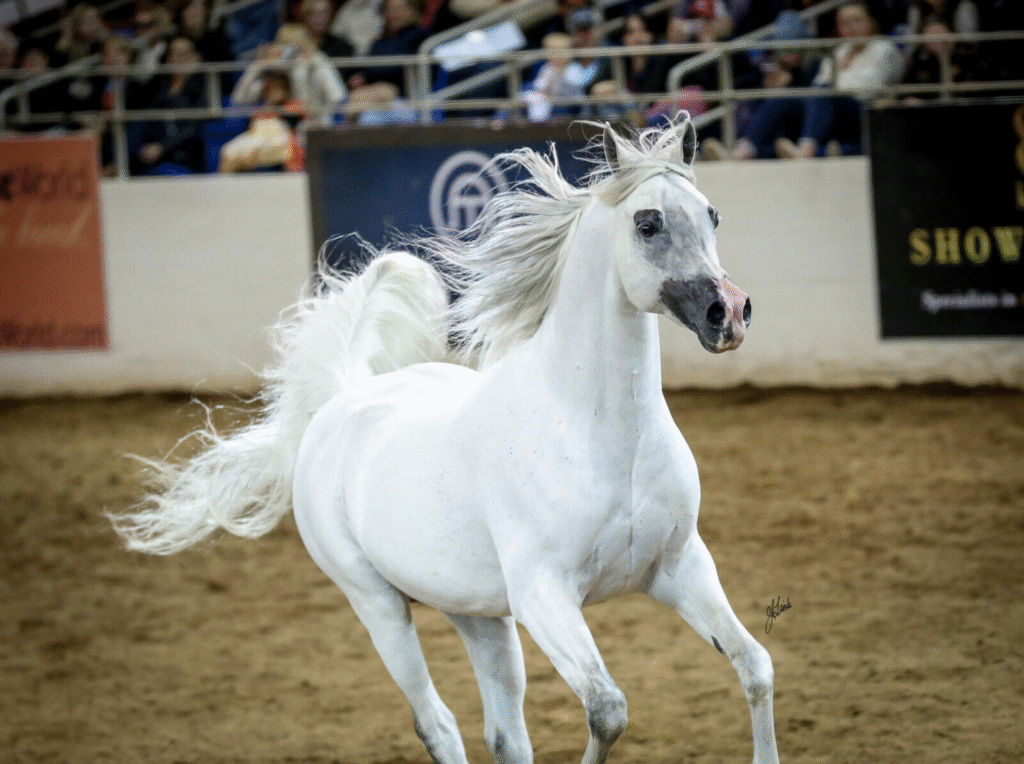Arabian horses are more than just a pretty face. With a history that dates back over 4,000 years, these horses were bred by Bedouins in the harsh deserts of the Middle East. Their strength, loyalty, and beauty weren’t just admired—they were essential for survival. Fast-forward to today, and Arabian horses remain one of the most admired and recognizable breeds in the world.
The Global Fascination with Arabian Horses

From the desert sands to modern arenas, Arabian horses continue to steal the spotlight. Their high tail carriage, chiselled features, and unique temperament make them standout contenders in both competitions and companionship.
What is the Arabian Horse’s Temperament?
Definition of Temperament in Horses
Temperament in horses refers to their natural behavior, responsiveness, emotional balance, and energy levels. It’s what determines whether a horse is calm, high-spirited, sociable, or aloof.
Typical Traits of the Arabian Temperament
Arabians are famously spirited yet gentle. They’re known for their alertness, sharp intellect, and eagerness to please. Unlike some breeds that may be docile but dull, Arabian horses are emotionally dynamic and deeply aware of their surroundings.
Arabian Horse Personality Traits

Intelligence and Curiosity
Arabians are thinkers. They process new information quickly and often seek out new experiences. This intelligence is part of why they’re such a joy (and challenge) to train—they get bored easily and require mental stimulation.
Loyalty and Bonding with Humans
Arabians form deep emotional bonds with their handlers. Once trust is established, an Arabian becomes a devoted partner. They thrive in environments where mutual respect and understanding are nurtured.
Energy and Endurance
Let’s not forget—Arabians are the marathon runners of the horse world. Their stamina is legendary. They can work for hours without tiring, making them perfect for endurance riding and long-distance trail adventures.
Sensitivity and Awareness
Arabians are incredibly in tune with their surroundings—and their rider’s emotions. This sensitivity is what makes them ideal for those who understand how to handle it with calm and consistency.
Arabian Horse Behavior Explained

Herd Dynamics and Social Nature
Arabians are social creatures. In herd environments, they are cooperative and interactive. They often form close-knit groups and enjoy a clear pecking order, which translates well into human interactions when respect is mutual.
How Arabians React to New Environments
Thanks to their curious nature, Arabians often respond to new environments with interest rather than fear—provided they trust their handler. That said, their alertness can sometimes come off as skittishness to those unfamiliar with the breed.
Playfulness and Alertness
These horses love to play! Whether it’s tossing their head, trotting with flair, or engaging with toys, Arabians display a youthful energy that persists well into adulthood.
Why Are Arabian Horses So Special?

The Mystique and History
Few breeds carry the weight of legend quite like the Arabian. Their influence on almost every modern light horse breed is undeniable. Their presence is not just physical—it’s historical and even mythical.
Versatility and Adaptability
Arabians can excel in various disciplines—endurance, dressage, show jumping, western pleasure, and even therapy work. Their ability to shift between roles is what sets them apart.
Physical Elegance Combined with Mental Agility
You get the best of both worlds: a horse that looks like royalty and thinks like a chess master. Their elegance is matched by their emotional intelligence.
The Role of Intelligence in Arabian Horses

Problem Solving and Learning Abilities
Arabians can figure things out—sometimes too well! They can open gates, remember routines, and even test boundaries. But with this intelligence comes a unique opportunity for advanced, rewarding training.
Training Responsiveness
With the right approach, Arabians are among the most responsive breeds. They respond best to positive reinforcement and a calm, confident handler.
What Is So Unique About the Arabian Horse’s Attitude?

Bold Yet Respectful
Arabians are courageous. They don’t back down from challenges easily but are not aggressive. Their bravery is balanced with a gentle heart.
Highly Trainable but Independent
While they learn fast, Arabians also have a streak of independence. They don’t blindly obey—they collaborate, which requires mutual respect rather than force.
Arabian Temperament vs. Other Breeds

Comparison with Thoroughbreds
Thoroughbreds are fast and focused on racing, but Arabians have greater endurance and emotional intelligence. While Thoroughbreds can be more reactive, Arabians are alert but thoughtful.
Comparison with Quarter Horses
Quarter Horses are calm and muscular, ideal for quick bursts of work. Arabians, in contrast, offer more stamina and personality, which appeals to those looking for a deeper horse-human connection.
Why Arabian Horses Excel in Endurance Races
They were built for the desert. Their compact bodies, large nostrils, and efficient oxygen use give them a physical edge in endurance sports, often outperforming all other breeds in 50-100 mile races.
Handling and Training Arabian Horses
Best Practices for Bonding
Spend time on the ground. Groom them, walk with them, talk to them. Arabians want to know you before they’ll give you their full trust.
Tips for First-Time Arabian Owners
Start slow, be patient, and be consistent. Don’t mistake their intelligence for disobedience—it just means you need to stay one step ahead.
Misconceptions About Arabian Horse Temperament

Are They Too Hot-Blooded?
Many label Arabians as “hot” or “high-strung,” but that’s often a misunderstanding of their energy and sensitivity. With proper handling, they’re incredibly manageable and gentle.
Are They Difficult to Train?
Not at all. They just need a thoughtful trainer. Harsh methods won’t work here. Positive reinforcement and mutual respect go a long way.
How Arabian Horses Communicate
Body Language and Vocal Cues
Arabians are expressive. Watch their ears, eyes, and tail—they’ll tell you everything. They also vocalize with soft whinnies or snorts when seeking attention.
Reading Emotions in Arabian Horses
From joy to nervousness, Arabians wear their hearts on their hooves. Once you learn to read their signals, it becomes easier to work with them in harmony.
Conclusion
Arabian horses are far more than just a pretty face with a proud tail. Their temperament is a rich blend of intelligence, loyalty, energy, and emotion. Whether you’re a competitive rider or someone looking for a soulful equine companion, the Arabian horse offers a depth of personality and performance that few other breeds can match. Understanding them is not just about reading traits—it’s about building a relationship. Once you do, you’ll never look at another horse the same way again.
FAQs
1. Are Arabian horses good for beginners?
Arabians can be great for beginners if the horse has been well-trained and the rider is calm and confident. Their sensitivity requires thoughtful handling.
2. How long do Arabian horses live?
They’re known for longevity, often living into their 30s with proper care.
3. Do Arabian horses get along with other breeds?
Yes, they are social animals and usually get along well in mixed herds if introduced properly.
4. Are Arabian horses high maintenance?
They don’t require special care beyond regular grooming, diet, and exercise. Their intelligence just means they need mental stimulation too.
5. What colors do Arabian horses come in?
Common colors include bay, gray, chestnut, black, and roan, with gray being particularly popular.







